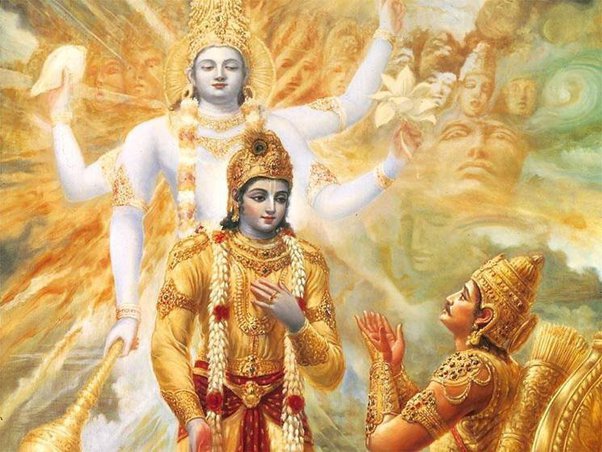The Shreemad Bhagavatam, a sacred text in Hinduism, is a treasure trove of stories and teachings that offer profound insights into the purpose of life. Among the many narratives within this scripture, the interactions between Lord Krishna and his devoted friend and disciple, Arjuna, exemplify how one can discover and fulfill their purpose. The four puruthas (goals of life), namely dharma (religious rites), artha (money), kama (desire for enjoyment), and moka (liberation), were overemphasized in the kinds of literature that Vysa had previously composed. People often practice dharma to obtain artha and complete their kmas. And when they are unhappy in karma, they consider moksha or giving up material possessions. Pacama-paratha, the fifth goal of life, which is prema or love of God, is more important and beyond these four; it can only be attained via the selfless practice of bhakti. A pure spirit soul can only experience infinite spiritual bliss in adoring God through bhakti. The Bhagavatam emphasizes the need for bhakti-yoga for achieving prema.
The Bhagavad Gita: A Guide To Dharma And Purpose
The most renowned section of the Shreemad Bhagavatam is the Bhagavad Gita, a conversation between Lord Krishna and Arjuna on the battlefield of Kurukshetra. Here, Arjuna faces a profound moral crisis as he prepares to engage in a war against his own relatives and loved ones. In his moment of doubt and confusion, he turns to Lord Krishna for guidance.
The Bhagavad Gita imparts several essential teachings:
a. Duty and Dharma: Lord Krishna emphasizes the importance of fulfilling one’s duty, or dharma, even in the face of adversity. He encourages Arjuna to embrace his role as a warrior and fulfill his obligations.
b. Self-Realization: Krishna teaches Arjuna the importance of self-realization and understanding one’s true nature. He emphasizes that the soul is eternal and beyond the physical body.
c. Detachment from Outcomes: One of the most profound teachings is the concept of performing actions without attachment to the results. This principle suggests that one should focus on the process and intention rather than being solely outcome-driven.
The Bhagavad Gita’s teachings guide us in finding purpose by reminding us that our life’s journey is shaped by our duties and responsibilities. When we align our actions with our inherent dharma and approach them with dedication and selflessness, we begin to discover our true purpose.
Arjuna’s Devotion and Surrender
Throughout the Mahabharata, Arjuna’s unwavering devotion to Lord Krishna serves as an example of how surrendering to the divine can illuminate one’s path and purpose. Arjuna’s trust in Krishna’s guidance, even in the darkest of moments, showcases the power of faith.
a. Seeking Guidance: When faced with dilemmas or uncertainties in life, we can emulate Arjuna’s approach by seeking guidance from a higher source, be it a spiritual teacher, inner wisdom, or a divine entity.
b. Surrender and Trust: Arjuna’s surrender to Krishna’s wisdom reminds us that sometimes, letting go of our ego and control can lead us to our true purpose. Trusting in a higher power can provide clarity and direction.
Krishna’s Divine Leelas
The Shreemad Bhagavatam also contains enchanting stories of Krishna’s childhood adventures and divine leelas (pastimes). These stories teach us that life’s purpose is not just about responsibilities and duties but also about embracing joy, love, and innocence.
a. Cherishing Innocence: Krishna’s childhood escapades, such as stealing butter or playing pranks, highlight the importance of preserving innocence and playfulness in our lives.
b. Cultivating Love: Krishna’s interactions with the Gopis and his divine love for Radha exemplify the power of pure, selfless love. These stories encourage us to cultivate love, compassion, and devotion as part of our life’s purpose.
Conclusion
The stories and teachings of Lord Krishna and Arjuna in the Shreemad Bhagavatam offer profound guidance on finding the purpose of life. The Bhagavad Gita imparts wisdom on duty, self-realization, and detachment from outcomes, emphasizing that our actions and responsibilities are integral to our purpose. Arjuna’s devotion and surrender to Krishna demonstrate the importance of seeking higher guidance and trusting in a divine plan.
Moreover, Krishna’s divine leelas remind us that life’s purpose is not just about fulfilling obligations but also about cherishing innocence, cultivating love, and experiencing joy. By integrating these teachings into our lives, we can embark on a journey of self-discovery and purpose, aligning ourselves with our dharma and realizing our higher calling. The Shreemad Bhagavatam’s timeless wisdom continues to inspire individuals on their quest to find meaning and fulfillment in life.
(Pictures used by the author for demonstrative purposes only.)
